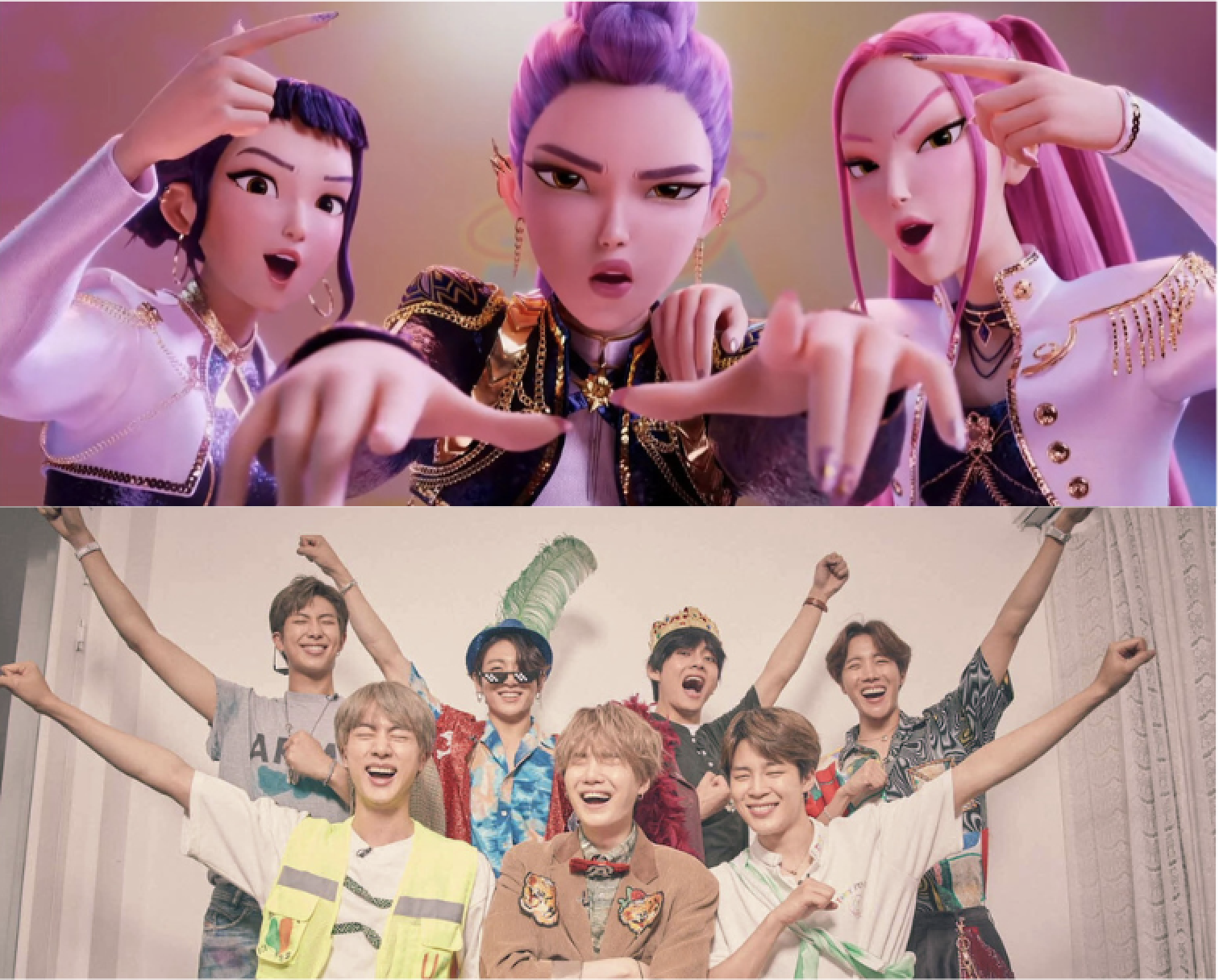When K-pop Demon Hunters (KDH) crashed into the media landscape, it ripped a glaring, ugly hole in one of the flimsiest, recycled, and tired anti-BTS talking points. You know the classic excuse: “Their music is not for me”. And now pixel versions of K-pop groups are exposing their bluff.
KDH’s soundtrack is undeniably good, and I won’t deny its applause. But is it unique? Innovative? A groundbreaking first in the Korean pop industry? A straight-up no, especially in an industry where the flag bearer artist is THE BTS.
Yet people who have spent years claiming K-pop “isn’t their thing” are glorifying this soundtrack like it’s some kind of revelation -and by some divine intervention, even getting it to chart.
Here’s the thing: songs in the soundtrack aren’t radically different from what BTS has artistically produced in their more than a decade-long career. It carries the same sonic DNA from chest-rising choruses, a mixture of Korean and English lyrics, and gut-wrenching instrumental and melodic hooks.
It’s all familiar territory.
Just using the song “Free” as an example, fans remixed it with not just one but two of BTS’s tracks – “Hold me tight” and “Butterfly” – garnering millions of views. This is not just a coincidence; it showcases that the movie’s track reflects a sound and style that recurs throughout BTS’s work, particularly in the Hwa Yang Yeon Hwa (HYYH) era.
The conclusion? Disdain for BTS is NOT about the music nor artistic merit, it’s everything else – the hype, visibility, and influence. If people can cheer on K-pop when it is repackaged and attached to a movie but scoff at it the second BTS’s name appears, that’s not taste — that’s bias.
Okay, maybe BTS songs sound as good as the KDH soundtrack, but do they carry the same emotional and thematic weight? This brings us to the second tired argument: “BTS’s music is shallow, appealing to their obsessed fan girls who don’t recognise real music.” This sentiment crumbles fast upon examining the extensive storytelling within their work and diverse discography.
BTS’s discography is loaded with social commentary, exploring societal pressure on the youth, self-identity, and mental health. Additionally, across their career, they make clever references to various literary works, such as the philosophical ideas of Carl Jung (Map of the Soul) and Hermann Hesse’s Demian.
Most notably, BTS’s HYYH series is an elaborate coming-of-age narrative extending beyond music, intricately unfolding through music videos, album notes, books, and a webtoon.
So BTS does not lack meaning; you’re just not looking.
Kim Namjoon, the leader of BTS, with an IQ of 148, surely would rather retire than dilute their craft to meaningless noise.
And if you think this is just fan girl hysteria and ‘delulu’ taking effect, let’s look at what the gatekeepers have to say: BTS is no stranger to critical acclaim. Take Kim Namjoon’s Right Place, Wrong Person (RPWP), which earned recognition from various outlets like Billboard, Rolling Stone, and NME, with Lea Salonga, a Tony Award-winning Broadway talent, stating: “As far as artistic output and creative output … [RPWP is] the hill I think would die on”
“As far as artistic output and creative output … [RPWP is] the hill I think would die on.”
Lea Salonga
So, the real demon we should be hunting? Hypocrisy – these people who gush over the KDH soundtrack while denying BTS as if the depth and artistry that they praise wasn’t already the standard in the Bangtan world.

All GREAT points 🙂 Love the extra sources!
My reasoning for preferring the KDH songs is because they are mostly in English, with a few Korean phrases scattered throughout. To my understanding, most K-pop songs are largely in Korean with a few English phrases, so I find it hard to follow or connect with them.
Anyway, really enjoyed reading the hot take 🙂
great analyzation, as a big army back then and a BIG FAN of both songs from the album, i didn’t realize they sound so much alike from the movie and maybe that’s the reason why Free is my most played from the soundtrack. i agree that non-kpop fans should realize that most of the songs from the film are just inspired by and sounds like from “real” kpop songs that have been already released and produced by these idols from these “kpop groups”.